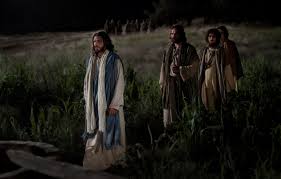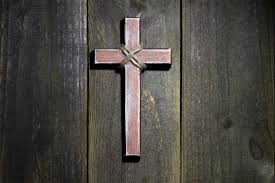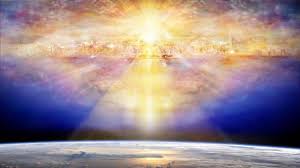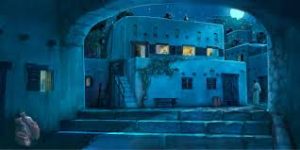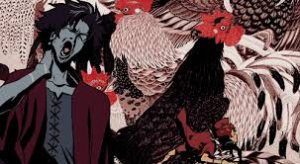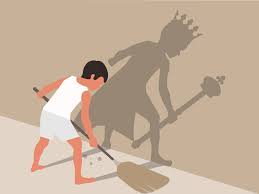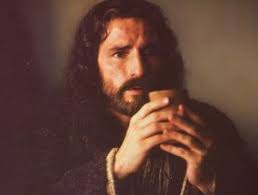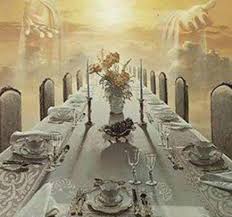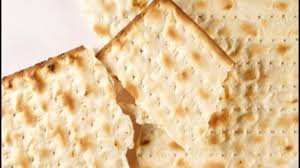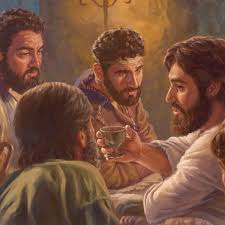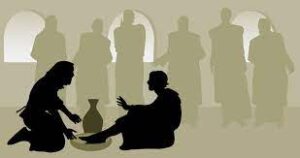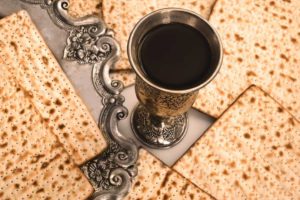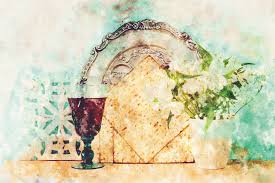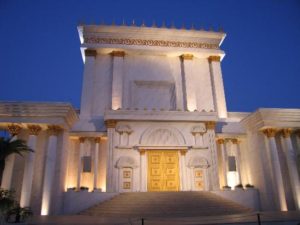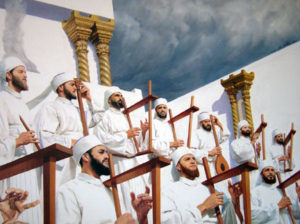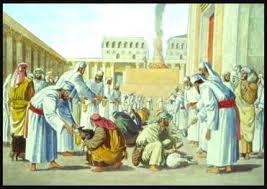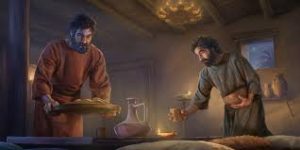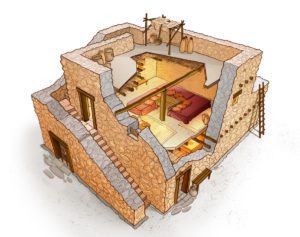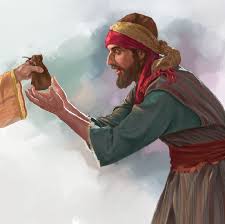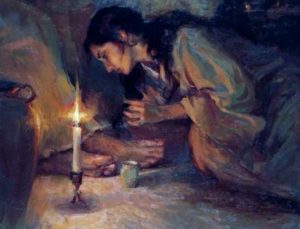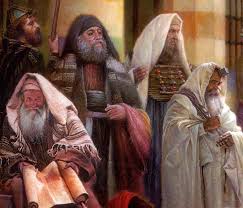Kt – I AM the True Vine John 15: 1-17
I AM the True Vine
John 15: 1-17
On the walk to Gethsemane
sometime between 11:00 pm and midnight,
the fifteenth of Nisan
I am the true vine DIG: How does the apostles’ experience exemplify the pruning process (John 15:5-8 and 18-21)? Yeshua repeats the words remain in Me, love and bearing fruit. Why are these words repeated? What is the fruit that will last (verse 16)? How do verses 9 and 12 go together? How is love the essential dynamic in the life of a believer? How do verses 12-13 take Messiah’s command to love even further than Yochanan 13:34-35? How does our relationship with Jesus change once we start practicing this example of love? What is the link between obedience and prayer (verses 7, 16; see 14:13-14)?
REFLECT: The vine describes both the Jewish people and their Meshiach. Gentile believers are the branches who are grafted into the vine (Romans 11:11-24). As either a part of the vine or a branch, how would you describe the fruit in your life? Do you feel more like Christ’s slave or His friend? What helps develop that friendship? Do we listen to Him? Or do we only want Him to listen to us? Do we want to know what’s on His mind? Or do we only want to tell Him what’s on ours?
After hearing of Christ’s imminent departure from the world, fear gripped the apostles like a steel vice. How could they possibly go on without the Master? What would happen to His Kingdom? Was the Lord challenging them to build a Kingdom without a King? Not really.
First, Yeshua promised that His going away played a crucial role in ADONAI’s plan to redeem the world and that He would return (John 14:1-15). Second, the Good Shepherd promised that He would not leave them as orphans to fend for themselves; He would be present with them in the person of the Ruach ha-Kodesh, whose role is to teach and provide courage (John 14:16-24). Third, the Lord promised that confidence in the truth of His words and comfort in His continual presence would grow as we obey Him (John 14:25-31).
The talmidim had placed their faith in Yeshua ben David, but they lacked maturity. Jesus had taught them divine truth for three-and-a-half years. However, it had not yet been put to the test. The time had come for these baby believers to begin walking on their own. Their only hope of overcoming the fear that gripped them so tightly was to allow confidence in the truth of the Meshiach to grow and to gradually replace it.1443
In Chapter 15, Jesus described three key relationships that every believer must have if they are to cultivate confidence and rise above the consequences of the Fall, including fear. The relationship of the believer and Jesus Christ (John 15:1-11); the relationship of the believer with other believers (Yochanan 15:12-17); and the relationship of believers to the world (John 15:18-27).
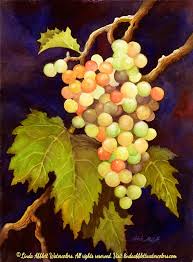
The relationship of the believer to Jesus Christ (John 15:1-11): Yeshua told His talmidim: I AM the true vine (John 15:1a). Isra’el is also God’s vine or vineyard (Isaiah 5:1-7, 27:2-6; Jeremiah 2:21, 12:10; Ezeki’el 17:5-6, 19:10-14; Psalm 80:8-16; Hosea 10:1; Joel 1:7 and also compare Yeshua’s parables in Matthew 21:33-34; Mark 12:1-12; Luke 20:9-19). The fact that the vine describes both the Jewish people and their Meshiach reinforces the close identification of Jesus and Isra’el (Mattityahu 2:15). The messianic Jewish remnant, or the righteous of the TaNaKh (Romans 11:1-10), will obey the Lord’s commands, stay attached to the true vine, and have the true vine’s power and strength to bring forth good fruit (Matthew 7:16-19). And so will the grafted-in Gentile believing branches (Rom 11:17-24).1444
Possibly walking past a vineyard, Yeshua said: My Father is the gardener (John 15:1b). This is the last of Jesus’ seven I AM’s (Yochanan 6:35, 8:12, 10:7, 10:11, 11:25, 14:6). The promise was clear: In Messiah and His disciples, the Father will find the kind of fruit He desires. We need to stay connected to the vine, drawing our nourishment from Christ. Our Father tends the vine and brings it to full fruitfulness.
He cuts off every branch in Me that bears no fruit, while every branch that does bear fruit He prunes so that it will be even more fruitful (John 15:2). The first two verses introduce the imagery of the vine in summary fashion, describing the general care of a gardener nurturing a vine. Gardeners are seldom seen cutting off branches during the growing season. Instead, they carry a bundle of strings and a pair of pruning shears as they work their way down each row. Every year in Palestine gardeners prune their vines. They cut off the dead wood that has no life in it and trim the living branches so that their yield will be greater. To conserve moisture in a dry land, vines were allowed to run on the ground until blossoms began to appear. Then they carefully lift sagging branches and tie them to the trellis – a procedure called “training.” They also strategically snip the smaller shoots from branches in order to maximize their yield of fruit, which is called “pruning.”1445
The Lord reassured the talmidim that they had already been pruned. You are already clean because of the word I have spoken to you (Yochanan 15:3). The adjective translated clean is based on the same verb for prune in verse 2. He followed this assurance with the command: Remain in Me, as I also remain in (Greek: ev) you. Remaining in terms of this metaphor refers to the branch remaining connected to the vine. No branch can bear fruit by itself; it must remain in the vine. Neither can you bear fruit unless you remain in (ev) Me (John 15:4). Branches that do not receive nourishing sap from the vine cannot produce fruit – or live.
A key to understanding what Yeshua meant by remaining is the expression in Me, which reflects the believers’ “union with, or in Christ.” Rabbi Sha’ul often described believers as being in (ev) the Messiah. The Greek preposition evis most often translated “in” (Yochanan 10:38; 14:10-11, 17, 20, here in John 15:4-7 and 16:33); however, its sense is hard to convey by a single English word, for it can mean in the sphere of, in connection with, within, inside, by on, near, among or with. Overall, the word conveys intimacy and involvement: Yeshua and the Father, or Jesus and the believer are intimately involved and concerned with each other’s existence, even to the point of being “one” (John 10:30, 17:21-23).1446
But how does the believer end up in Christ?
First, God raises us up and seats us in Christ, at the right hand of the Father (Psalm 110:1; Matthew 22:44; Acts 2:34, 7:55; Ephesians 1:1, 3-4, 6-7, 9, 11-13, 20), where as our High Priest, He continually intercedes for us (Job 16:19-21; Romans 8:26-27, 34; Hebrews 7:25; First John 2:1).
Secondly, God unites us with Himself in Christ (John 6:56, 17:20-23; Romans 7:4, 12:5; Eph 4:25, 5:30).
Thirdly, God seals us with His Holy Spirit (Ephesians 1:13-14; Second Corinthians 1:21-22), and baptizes us in (ev), by (ev), and with (ev) the Ruach ha-Kodesh (Matthew 3:11; Mark 1:8; Luke 3:16; John 1:33; Acts 1:5, 11:16; First Corinthians 12:13), into the Body of Christ (Galatians 3:27; First Corinthians 12:13).
The result of what God does for us at the moment of faith (to see link click Bw), is that through the baptism of the Holy Spirit, there is the actual uniting of the believer to Christ in such a manner that what is true of Messiah becomes true of the believer, minus His deity. This is called “union with Christ.” The Ruach is placed in us and we are placed in Christ at the moment of faith. This union is personal, intimate, and cannot be broken. Ever.
In order to make the teaching drawn from nature to be clearly understood, Messiah said: I AM the vine; you are the branches. If you remain in (Greek: ev) Me and I in (Greek: ev) you, you will bear much fruit; apart from Me you can do nothing (John 15:5). All believers have a “union with Christ.” But if we attempt to operate independent of Him, we will not bear fruit. We can’t! Operating in the flesh will produce no lasting fruit. Everything done in the flesh will produce only wood, hay and straw, which will be burned up one day (see my commentary on Revelation Cc – For We Must All Appear Before the Judgment Seat of Christ).
We all need constant cleansing and pruning. But pruning is a delicate art. You can cut too soon, too fast and too much. The result will be injured branches and poor fruit. Our heavenly Father is the ultimate Gardener. He prunes (disciplines) us so we will bear more fruit. Pruning is not punishment. ADONAI does not punish us for doing something wrong. As First John 4:18 says: There is no fear in love. But perfect love drives out fear, because fear has to do with punishment. Discipline is always future-oriented. For our earthly fathers disciplined us for a few years, doing the best they knew how. But God’s discipline is always good for us, so that we might share in his holiness (Hebrews 12:10-11 NLT).
If you do not remain in Me, you are like a branch that is thrown away and withers; such branches are picked up, thrown into the fire and burned (Yochanan 15:6). The word like very important here. There are four different kinds of parables, one of which is called a simile that uses the terms “like” or “as.” Story parables are longer, but similes can be much shorter, like a sentence in this case. You can’t press the details here because you can’t derive doctrine from a parable or an allegory.
If the details are incorrectly pressed in this case some people read this verse and wrongly conclude that since believers are the branches in the previous verse we can lose our salvation and be thrown into the fire of hell and burned. Nothing could be further from the truth (see Ms – The Eternal Security of the Believer). But this verse does teach that like a dead branch, a person without the Lord of Life is spiritually dead, and therefore will be punished with eternal fire (Mattityahu 25:46; Luke 12:4-5).
Jesus quickly turned from the negative to the positive . . . and to prayer. If you remain in Me and My words remain in you, ask whatever you wish, and it will be done for you (see John 14:13-14). Effective prayer is based on faith in Messiah and on His words remaining in believers. Yeshua’s words condition a believer’s mind so that his or her prayers want to conform to the Father’s will. Since such a prayer is in accordance with God’s will, the results are certain. This is the confidence we have in approaching God: that if we ask anything according to His will, He hears us. And if we know that He hears us – whatever we ask – we know that we have what we asked of Him (First John 5:14-15).
Furthermore, Yeshua declared: This is to My Father’s glory, that you bear much fruit, showing yourselves to be My talmidim (Yochanan 15:7-8). Fulfilled prayers bring glory to the Father because, like Christ, His talmidim were doing the heavenly Father’s will: Our Father in heaven, hallowed be Your name, Your Kingdom come, Your will be done, on earth as it is in heaven. Give us this daily bread. And forgive us our debts, as we also forgive our debtors. And lead us not into temptation, but deliver us from the evil one (see Dp – When You Pray, Go Into Your Room and Close the Door).
As the Father has loved Me, so have I loved you. Now abide in, or remain in My love (Yochanan 15:9). When you abide somewhere, you live there. You grow familiar with the surroundings. You feel at home. So to remain in Christ’s love is to make His love your home. Not a roadside park or hotel room you occasionally visit, but your preferred dwelling. You rest in Him. When thunder claps, you step beneath His roof. His walls secure you from the winds. His fireplace warms you from the winters of life. As Yochanan would later write: We take up residence in a life of love (First John 4:16 MSG). You abandon the old house of worry and false love and move into His home of security and true love.1447
A believer is motivated by the wonder of Messiah’s love, which is patterned after the Father’s love in its quality and extent. If you keep My commands, you will remain in My love, just as I have kept My Father’s commands and remain in His love (John 15:10). Jesus rewards those who seek Him. And as the Spirit of the Lord works within us, we become more and more like Him (Second Corinthians 3:18 TLB). Can you think of a greater gift than to become more like Messiah? The Lord felt no guilt; God wants to banish yours. Jesus had no bad habits; YHVH wants to remove yours. Christ had no fear of death; God wants you to be fearless. Jesus had kindness for the diseased, mercy for the rebellious and courage for the challenges of life. God wants you to have the same. He wants you to be just like Yeshua.1448
I have told you this so that My joy may be in you and that your joy may be complete (Jn 15:11). Jesus had great joy in pleasing His Father by living a fruitful life (Heb 12:2). The purpose of His teaching is to give us an abundant life, not a joyless existence (Jn 10:10). The commands for us to obey are for our joy (Jn 17:13).1449
The relationship of the believer with other believers (John 15:12-17). Yeshua gave one primary command to believers; they must love each other. Believers grow by caring and nurturing each other. The standard for the love is Messiah’s example of humble sacrificial service: as I have loved you (Yochanan 15:12). In a worldly sense, this command seems impossible. How can we possibly love someone we barely know and for whom we have no feelings? The world’s concept of love is self-oriented, performance based, and driven by fickle sentiment. People fall in and out of love as though it were a random, mysterious force that affects two minds for a season and then vanishes as quickly as it came.
The Greek word here is not the fickle eros, or even the heartfelt philia, but agape. This kind of agape love involves deep feeling, but it begins with a decision. Agape doesn’t consider merit and doesn’t wait for inspiration. Agape is the kind of love exemplified by ADONAI, especially toward His Son. Furthermore, the tense of the verb is present, which suggests a repeated or ongoing action: “keep on loving one another.” The quality of that love must be the same kind as the love we receive from Christ. He is our example and our standard.1450
A friend is someone who loves you, who has your best interests at heart, who stands by you in your lowest moments and sacrifices himself or herself to meet your need. Have you ever had someone you thought was a friend desert you when the chips were down? Maybe you have seen friends scatter during times of adversity. But I hope you’ve had a friend stick by you through a tough time, demonstrating commitment and love. Proverbs 17:17 says: A friend loves at all times, and a brother is born for a time of adversity.1451
Now comes the reference to the greatest love of all. Greater love has no one than this: to lay down one’s life for one’s friends (Yochanan 15:13). Everything must be less. This is the supreme test of love. In context, this must refer primarily to the love Yeshua has shown on the cross. There He laid down His life on behalf of His friends. This is how we know what love is: Jesus Christ laid down His life for us (First John 3:16).
The use of the Greek word philos (friend, comrade) is unusual with respect to Jesus, who usually was addressed as Lord, Master, Rabbi, or my God. Philos in this context suggests a peer relationship. We certainly cannot claim equality with Messiah, even when we eventually see Him face to face and are made like Him (First John 3:2). The relationship is one in which Yeshua elevates us to a higher standing then we deserve; however, His superiority is never compromised.1452
You are My friends if you do what I command (John 15:14). This does not mean that we must obey perfectly; after all, we’re just human. Instead, this speaks to our intent to pursue His aims by following His commands. A slave doesn’t have a close relationship with his or her master, as friends do. The slave is no more than an instrument. But there are no secrets among friends. Therefore, the Lord says: I no longer call you slaves, because a slave doesn’t know his master’s business. Instead, Jesus takes you into His confidence and declares: I have called you friends (John 15:15a CJB). Through Yeshua’s sacrifice, our past is pardoned and our future is secure. And since we have been justified through faith, we have peace with God (Romans 5:1). Peace with God. What a happy consequence of faith! Not just peace between countries, peace between neighbors, or even peace at home. Salvation brings peace with God. Whether isolated by our own choices, the cultural trends around us, or by the painful losses of life, all who know Christ can rest in the presence of the Shepherd of our hearts. God is no longer a foe, but a friend. Consequently, we are at peace with Him. What a friend we have in Jesus!1453
Because everything I have learned from My Father I have made known to you (John 15:15b CJB). Remember how ADONAI searched for Abraham to reveal His plan to him? Well, Abraham believed God, and it was credited to him as righteousness, and he was called God’s friend (James 2:23). Now Jesus tells us that He has revealed everything His has learned from the Father to us. We are no longer slaves to sin, but His friends. And as proof that we are joined at the heart, the Creator of the universe has invited us to relate to Him in this profound way. Consequently, the basis of our faith is a relationship with Him.
Believers are chosen and appointed for the purpose of bearing fruit. You did not choose Me, but I chose you and appointed you so that you might go and bear fruit – fruit that will last – and so that whatever you ask in My name the Father will give you (see Kq – No One Comes to the Father Except Through Me). This is my command: Love each other (John 15:16-17). Jesus is not suggesting a legalistic walk with Him. We are not saved by how we behave; we are saved by what we believe. Belief always precedes behavior (Second Cor 3:5-6). We are to do what we believe and become what we already are in Christ. It is the Holy Spirit who bears witness with our spirit that we are the children of God (Romans 8:16). And it is the Ruach who enables us to walk by faith.1454 Jesus’ concluding command not only brackets His teaching on love in the kingdom of God, it also introduces the contrasting kind of relationship that exists between the Kingdom and the world.
Dear Friend,
I just had to send a note to tell you how much I love you and care about you. I saw you yesterday as you were walking with your friends. I waited all day long hoping you would want to talk with Me also. As evening drew near, I gave you a sunset to close your day and a cool breeze to rest you. And I waited. But you never came. It hurt Me, but I still love you because I AM your friend.
I saw you fall asleep last night and I longed to touch your brow. So I spilled moonlight on your pillow and your face. Again I waited, wanting to rush down so that we could talk. I have so many gifts for you. But you awakened late the next day and rushed off to work. My tears were in the rain.
Today you looked so sad, so all alone. It makes My heart ache because I understand. My friends let Me down and hurt Me so many times too. But I love you. I try to tell you in the blue sky and in the quiet, green grass. I whisper in the leaves on the trees and breathe in the colors of the flowers. I shout it to you in the mountain streams and give the birds love songs to sing. I clothe you in the warm sunshine and perfume the air with nature’s scents. My love for you is deeper than the oceans and bigger than the biggest want or need you have.
If you only knew how much I want to help you. I want you to meet My Father. He wants to help you too. My Father is that way you know. Just call Me, ask Me, talk with Me. Please, please, don’t forget Me. I have so much to share with you. But I won’t bother you any further. You are free to call Me. It’s up to you. I’ll wait because I love you.
Your Friend,
Jesus



